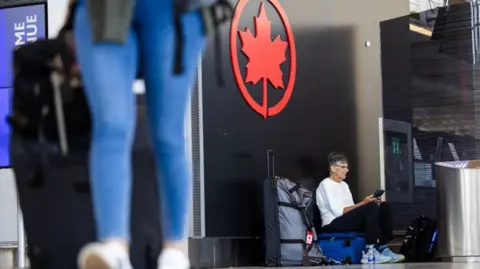Air Canada has announced the resumption of its flights following a tentative pay agreement reached with the union representing the airline’s flight attendants. This development comes after a significant disruption that began on Saturday, grounding numerous flights and leaving thousands of passengers stranded across various airports.
The union, which represents more than 10,000 flight attendants, confirmed that a deal had been reached, and Air Canada subsequently stated that flights would start to resume later this Tuesday. Although the full details of the agreement have not been disclosed, the union characterized it as a transformative change for its members and the wider industry. Following ratification, the agreement will be presented to the members for approval.
Renewing operations can take time, as Air Canada indicated that the first flights would be up and running on Tuesday evening; however, it may take several days to achieve full operational capacity due to logistical setbacks, including repositioning aircraft and crew. In light of these disruptions, the urgency of the negotiations had heightened, especially as the airline is Canada’s largest and manages around 700 flights daily, catering to both domestic and international travelers.
The breakthrough in negotiations occurred hours after discussions commenced, facilitated by an approved mediator appointed by the government. In a statement released by the Canadian Union of Public Employees (CUPE), the union declared that “unpaid work is over,” calling the negotiations a historic fight for workers’ rights in the aviation industry. The union also urged its members to cooperate fully with the resumption of operations, indicating readiness to establish normalcy post-strike.
This dispute escalated when CUPE rejected a return-to-work order put forth by the Canadian Industrial Relations Board, which had labeled the flight attendants’ strike as unlawful. In response to the announcement of a tentative deal, Air Canada confirmed that operations would resume but cautioned that it would take a while to return to its usual service levels.
During the negotiation period, Air Canada proposed a salary increase of 38% over four years, which included a 25% wage increment in the first year. However, CUPE dismissed this offer as inadequate, stating it was “below inflation, below market value, below minimum wage.” Additionally, even with the proposed raise, flight attendants would still be unpaid during specific hours of work, including boarding procedures and waiting time at airports prior to their flights.
The situation was further complicated when the Canadian government suggested that both parties enter binding arbitration and return to work, a proposal CUPE denounced as yielding to corporate pressure. Following CUPE’s refusal to comply with the arbitration request, federal Jobs Minister Patty Hajdu called for both sides to resume talking and promised an investigation into allegations of unpaid work conditions within the airline sector.
The almost four-day strike has significantly impacted more than 500,000 passengers, leading to disruptions and cancellations across Air Canada’s extensive flight network. The scope of the strike highlighted broader issues surrounding working conditions and pay in the airline industry, making this negotiation a pivotal moment for flight attendants in Canada. With this tentative agreement, the hope is to address some of these ongoing concerns while ensuring that flights can operate smoothly once again.
As news surrounding this flight service resumption continues to evolve, it remains clear that both Air Canada and CUPE are at a crucial juncture in redefining labor relations within the airline, an industry often characterized by its complex dynamics and demands.












